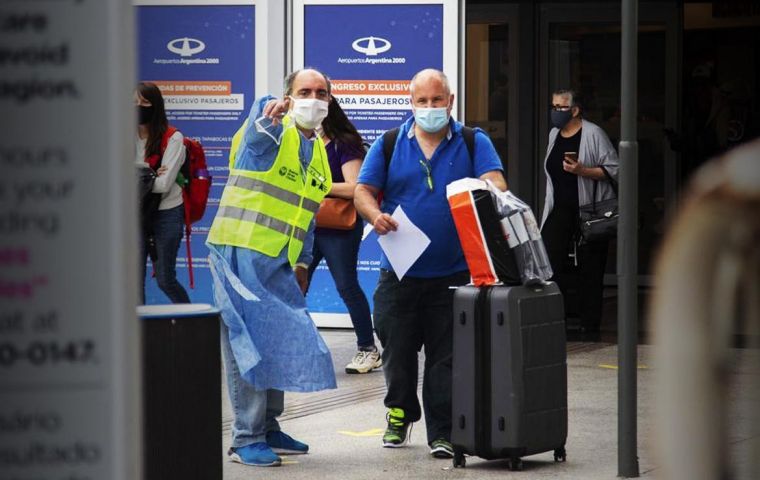MercoPress. South Atlantic News Agency
Argentina slowly allows for return of more nationals stranded abroad
 Passenger flights from the United Kingdom, Chile, Brazil, India and African countries continue to be suspended.
Passenger flights from the United Kingdom, Chile, Brazil, India and African countries continue to be suspended. After rumours of all kinds, it was announced Friday that Argentina would gradually increase the number of travellers who may come back to the country through the Ezeiza international airport in Buenos Aires.
Before June 25, the limit was set at 2,000 passengers a day, but it was brought down to 600 in a drastic move to keep the Delta variant of the coronavirus at bay. That measure was in force until Friday and, so sudden as it was, it ended up leaving over 10,000 Argentines stranded abroad.
As of Saturday, July 10, the new cap has been raised from 600 daily passengers to 5,200 per week, or 742 per day, for the week of July 10 to 16; 6,300 (at a rate of 900 per day) between July 17 and 23 and 7,000 (1,000 daily) between July 24 and August 6.
A statement from the president insisted that “the borders continue to be closed to tourism” and that “anyone who is not Argentine and wants to enter the country with the purpose of doing tourism will not be able to do so.”
Passenger flights from the United Kingdom, Chile, Brazil, India and African countries continue to be suspended.
Meanwhile, two passenger ships per week are to be allowed into the port of Buenos Aires, but at a 50% capacity.
Travelers from abroad are mandated to isolate themselves at the places determined by the provincial governments and the CABA, for 10 days from the date of the negative test carried out in the country of origin. The stay at such places will be at the expense of the passenger.
Checkups will be performed to guarantee passengers under quarantine are complying with their isolation, for if they are not they might face criminal charges.
Travelers must undergo a test to be able to board the plane bound for Argentina. In addition, a test must be done upon arrival in the country and another test on the seventh day of entry. Those who are negative, upon entering the country, must comply with isolation in the places provided by the provincial governments and the CABA and must take a new test to complete it.
Those who test positive upon entering the country must carry out another genomic sequencing test and, together with their close contacts, carry out isolation in the places indicated by the national authorities.
All tests and stays at isolation places will be at the expense of the passenger.
The traveler must declare the places where he / she was in the last 14 days prior to re-entry to the country.
For authorized entry as an exception for migration, through land crossings, the provincial jurisdiction must provide safe corridors. Non-resident foreigners who enter to develop essential jobs, with authorization from Immigration, must comply with the quarantine.
The provinces must control compliance with the isolation of people admitted from abroad.
Regarding land crossings, foreigners and nationals must have a negative Covid test valid for 7 days and performed prior to starting the trip near the place of residence
Foreigners arriving in ships must remain on board and will not have relief in the country; nationals, carry out an antigen test within 72 hours of admission;
Air travel foreigners must move under bubble mode in the country and comply with health protocols; nationals must move abroad under bubble modality and carry out antigen tests at least every 15 days or less. The rule also applies to the transfer crew if they have not followed bubble mode.
Carrirs must inform users of the current restrictions, the conditions set by each jurisdiction in which the traveler resides and the possibility that they may be modified according to the epidemiological situation.
Argentine citizens and residents are advised against traveling abroad, especially those who are in risk groups, in order to avoid the difficulties and sanitary conditions required upon re-entry, considering the rapid evolution of epidemiological conditions, while international group trips continue to be suspended.




Top Comments
Disclaimer & comment rulesCommenting for this story is now closed.
If you have a Facebook account, become a fan and comment on our Facebook Page!